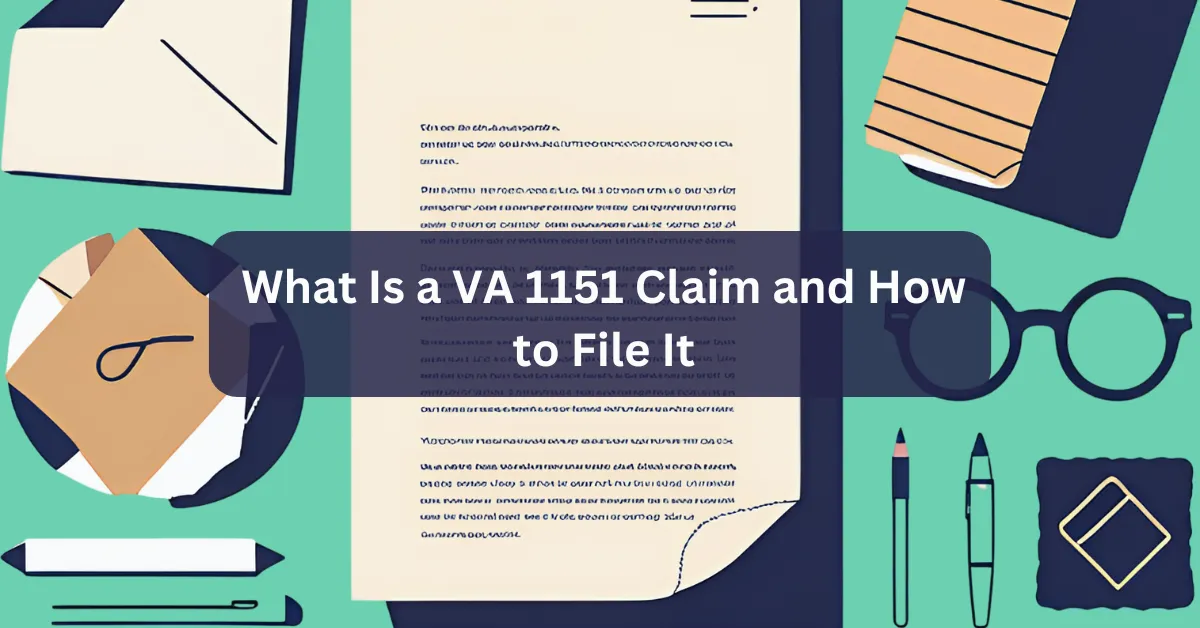You expect quality care when you seek medical treatment at a VA facility. But what happens if that care leads to a new disability or worsens your condition? That’s where VA 1151 claims come in.
A VA 1151 claim allows veterans to receive compensation for injuries caused by VA medical negligence, surgical errors, or improper treatment.
It’s different from a standard VA disability claim because it focuses on the harm caused by VA healthcare itself.
In this guide, we’ll break down what a VA 1151 claim is, who qualifies, and how to file successfully—so you can get the benefits you deserve.
What Is a VA 1151 Claim?
A VA 1151 claim is a special type of compensation claim under 38 U.S.C. § 1151. It provides benefits to veterans who suffer disabilities due to negligence, mistakes, or improper medical treatment by the VA.
Unlike regular VA disability claims, 1151 claims don’t require a service connection. Instead, you must prove that a VA doctor, hospital, or treatment program directly caused or worsened your condition.
Common reasons for VA 1151 claims include:
- Surgical errors or complications
- Misdiagnosis or failure to diagnose
- Incorrect prescriptions or medication errors
- Infections from VA hospital stays
If successful, a VA 1151 claim provides compensation similar to a regular service-connected disability claim. As a result, you can get the support you need.
The following tables showcase the differences between a VA 1151 claim and a standard claim:
| Factors | VA 1151 Claim | VA Standard Claim |
| Reason | For disabilities caused or worsened by VA healthcare | For disabilities caused or worsened in the line of service |
| Evidence Needed | VA Treatment connection, medical records, etc. | Medical Reports, service connection, STRs, etc. |
| Compensation | Traditional Ratings + Additional Benefits, if applicable | Traditional Ratings + Additional Benefits for specific conditions or ratings |
Eligibility Criteria for a VA 1151 Claim
To qualify for a VA 1151 claim, you must meet specific conditions. First, your injury, disability, or worsening condition must result directly from VA healthcare. This includes:
- VA hospital stays, surgeries, or treatments
- Participation in a VA rehab or training program
- Use of VA-provided medical equipment or prescriptions
Additionally, you must prove that your injury was caused by one of the following:
- Negligence or medical error by VA healthcare providers
- A lack of proper skill, care, or incorrect treatment
- An unforeseeable complication that wasn’t properly addressed
Importantly, pre-existing conditions that naturally progress don’t qualify. You must show clear evidence that the VA’s actions—not your underlying health—caused the harm.
How to File a VA 1151 Claim
Filing a VA 1151 claim requires careful documentation and a clear explanation of how VA medical treatment caused your disability. Follow these steps to strengthen your case.
Gather Medical Evidence
You’ll need medical records showing the VA treatment that led to your condition. Obtain hospital reports, doctor’s notes, and prescriptions related to your injury. If possible, get an independent medical opinion supporting your claim.
Fill Out VA Form 21-526EZ
This is the standard form for VA disability claims. Clearly explain how your injury resulted from VA negligence, lack of skill, or an unforeseeable event. Attach all supporting documents to avoid delays.
Submit Your Claim
You can file your completed form online through VA.gov, mail it to your regional VA office, or submit it in person at a VA benefits office.
Follow Up on Your Claim
Once submitted, track your claim status through VA.gov or by calling the VA directly. Be prepared for additional requests for evidence or medical exams.
Submitting a detailed and well-supported claim increases your chances of approval, so take your time to gather strong evidence before filing.
What to Expect After Filing
After submitting your VA 1151 claim, the VA will review your evidence and may request a Compensation & Pension (C&P) exam. This medical evaluation helps determine if VA treatment directly caused your condition.
Depending on claim complexity and backlog, the VA’s decision process can take several months. If approved, you’ll receive monthly compensation based on your disability rating.
If denied, you have the right to appeal through the Higher-Level Review, Supplemental Claim, or Board Appeal options.
Patience is key, but staying proactive and informed throughout the process will help you get the benefits you deserve.
Tips for Strengthening Your 1151 Claim
A strong VA 1151 claim requires clear evidence and expert support. Here’s how to improve your chances of approval:
- Get an Independent Medical Opinion – A private doctor’s statement linking your disability to VA negligence can carry weight.
- Provide Detailed Medical Records – Ensure all hospital reports, prescriptions, and VA treatment notes highlight the cause of your injury.
- Submit Witness Statements – Testimonies from family, caregivers, or fellow veterans can strengthen your case.
- Follow Up Regularly – Keep track of your claim status and respond promptly to any VA requests.
A well-documented claim reduces delays and increases your approval odds.
Conclusion
Filing a VA 1151 claim can be complex, but you can secure the compensation you deserve with strong evidence and persistence.
Focus on medical documentation, expert opinions, and staying proactive throughout the process.
If your claim is denied, don’t lose hope—you have multiple appeal options to fight for your benefits.
Consider working with a VA-accredited attorney or claims expert to navigate the process. Take action today and get the support you’ve earned!
